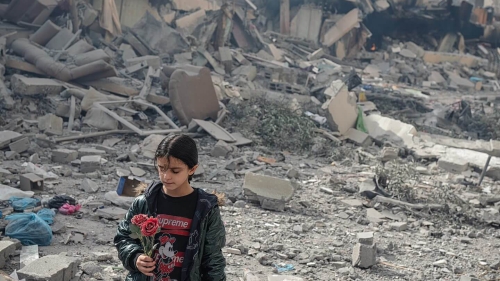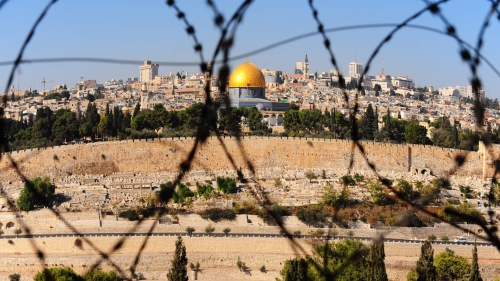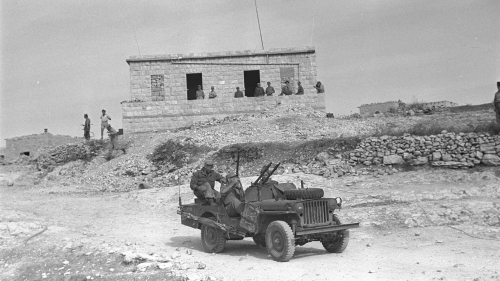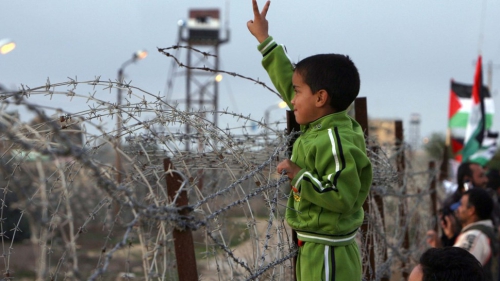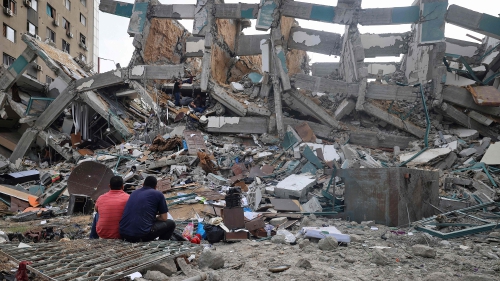Clinton's Trojan Horse: An Analysis of the Latest Peace Proposal
With the heavy losses the Palestinians are suffering on a daily basis, in terms of human life, freedom of movement, and economic activity, it is only logical that they would desire nothing more than a peace settlement and an end to their 52 years of suffering.
To the uninformed observer, it is easy to blame Arafat for rejecting Clinton's proposal which, at first glance, appears as a fair compromise. Unfortunately, Clinton's proposal is just another attempt to impose the Israeli agenda, at the expense of Palestinian national rights. Almost every term in the proposal violates Palestinian rights, contrary to the declaration of principles agreed upon at the start of the "peace process".
Terms of Reference
The Declaration of Principles was signed in 1993 on the basis of international legitimacy and the related United Nations resolutions: 242 and 338, pertaining to withdrawal from occupied territories - 181 and 252, pertaining to Jerusalem - 194, pertaining to the refugees - and 486, pertaining to the illegal Israeli settlements on occupied Palestinian territories. The Clinton proposal brushes aside all those resolutions, and attempts to delegitimize the Palestinian claims and rights.
Sponsorship
The fact that the United States is Israel's strongest ally automatically disqualifies it from pretending to be an "honest broker." It has become increasingly obvious that the United States is only interested in enforcing Israel's desires, at the expense of Palestinian rights. The Clinton administration has allowed the transitional phase to expire without Israel fulfilling the obligations that it had committed itself to.
Palestinian rights should not be at the mercy of Israel and its ally, and the only way the process could move forward is if it is under international sponsorship, including a strong role by the UN. The US has intentionally imposed the absence of the UN in an attempt to ignore the relevant UN resolutions on which the process should be based.
Furthermore, the vagueness of Clinton's proposal requires international sponsorship in order to create a balanced interpretation and to guarantee Israel's implementation of its obligations. In contrast, the absence of international sponsorship represents a green light for American-backed Israeli evasion and maneuvering.
Land
At its most basic level, the Palestinian-Israeli conflict remains a dispute about land. Accordingly, this issue will determine the new state's viability, its access to resources, its capacity for development, and its ability to defend itself.
UN resolution 242 stipulates a return to the 1967 borders, which constitute 22% of historical Palestine for the Arabs. Palestinian acceptance of this, and relinquishing their historical and legal rights to the rest of Palestine, represents an extraordinary compromise. Yet, the American-Israeli plan seeks to trim this tiny area even further.
1. The proposal gets tricky with the ratio game, trimming as much as it can from the original homeland:
a) The formula does not include Jerusalem, which Israel has illegally annexed, nor Latron and the Dead Sea - effectively slicing off a chunk of 18%, and leaving 82% of the areas for negotiation.
b) Israel is demanding to keep 80% of its settlements, despite their illegitimacy and complications, in exchange for a questionable land-swap. This represents 10% of the Palestinian area, but Clinton, posing as the even-handed mediator, has suggested a halfway solution at 5%, thus touting his "generous" offer of 95%. Deducting this 5% from the 82% leaves 77%.
c) The proposal demands a further 5% for security reasons, as well as leasing 3% for 999 years - leaving only 69% of the 22% for the Palestinian state - i.e. 15% of historical Palestine!
Clinton is praising Barak for the courageous compromises, and the Israeli right wing is protesting that Barak is giving away too much, and that they would not comply with his concessions!!
2. Further land exchange is set as a precondition, and not a result of negotiations between two independent states. The proposal requires letting go of 5% of Palestinian land occupied in 1967 in exchange for 1-3% of land occupied in 1948. The Israelis would receive prime fertile areas, including a water basin, as well as strategic areas that would besiege Arab Jerusalem. In exchange, the Palestinians would be compensated with desert land used as a dumpsite for Israel's nuclear waste.
3. The proposal ensures continuity of territories annexed or leased by Israel, whereas Palestinian lands are disconnected into separate cantons. This geographical separation will allow Israel more control of Palestinian movement, disrupt the future life of the Palestinian people, and reduce the potential for creating a viable and sustainable Palestinian state.
4. The leasing of lands for such a long period (999 years) can only be interpreted as an annexation under disguise.
5. The joint borders following the proposal's guidelines would be ten times longer than they would be if withdrawal occurs from all territories occupied in 1967. The friction points are therefore increased, as is the potential of future conflict. Since Israel will always posses the stronger arm, such conflicts will play in its favor, enabling it to swallow more land, restrict Palestinian movement, etc.
6. Israel's annexations of unpopulated areas under the pretext of security, e.g. on the eastern borders along the Jordan River, is not consistent with Palestinian sovereignty, reducing the aspired state to a subordinating entity.
Jerusalem
Clinton proposed a general principle that Arab regions go to Palestine and Jewish regions go to Israel. There is a Jewish quarter in Arab East Jerusalem, but it is hard to foresee Israel relinquishing any part of West Jerusalem. The numerous complications that can be found in Clinton's proposal include:
1. Dividing Jerusalem: The principle of Israeli sovereignty over sites that have connection with the Jews within the borders of East Jerusalem is not acceptable as this violates UN resolution 252 and would disperse the city into a complicated mosaic.
2. Haram Al Sharif: Full sovereignty over the Haram Al Sharif is essential, as opposed to certain parts, not limited to the surface, but also including the area beneath the compound. Israel has already excavated beneath the Muslim holy site during Netanyahu's reign, and there is no need to leave the door open for further excavations or extremist threats.
3. Al-Buraq Wall: The "Wailing Wall", as Jews call it, is 58 meters long. However, the vague definition in Clinton's proposal may enable Israel to claim its extension to include the entire Western Wall, which is 485 meters long, as well as the air space above it. The whole wall is part of the Aqsa Mosque and there shouldn't be any fragmentation of sovereignty over it.
4. Judaization: The proposal ignores the fact that 70% of West Jerusalem is based on stolen Arab properties, and ignores the rights of their dispossessed owners.
Right of Return
The issue of the refugees is at the core of the Arab-Israeli conflict. The refugees have inalienable rights to return to their homes from which they were evicted. This legitimate rights were recognized and ratified by UN resolution 194. Clinton's proposal violates this and suggests imposing resettlement elsewhere, which is totally unacceptable.
1. Right of Return: All displaced Palestinians should be given the right to return and the freedom of choice to return to their homes and properties from which they were evicted.
2. Right of Compensation: The displaced Palestinians should also be guaranteed the right of compensation for all the years that they were deprived of their properties.
3. Arab Absorption: Clinton's proposal imposes on Arab countries to absorb Palestinian re,fugees as citizens. This is unacceptable, as the refugees should have the freedom of choice.
4. Jewish Immigration: It is unfair to recognize the alleged right of return of millions of Jews after thousands of years while denying the Palestinians the same rights and evicting them on a daily basis. Israel claims that it cannot absorb Palestinian refugees; however, it is always ready for unlimited Jewish immigration.
Settlements
The relentless creation of Jewish settlements in the West Bank and Gaza has been an intentional Israeli strategy to consolidate control over the Gaza Strip and the West Bank, including East Jerusalem. Israeli settlement construction has served not only to facilitate territorial acquisition but also to justify the continuing presence of Israel armed forces on Palestinian lands.
Israeli settlements have been built on Palestinian lands in violation of UN resolutions as well as stated US positions, which consider settlements as illegitimate, and an obstacle in the path of peace. Yet, Clinton's proposal seeks to accommodate and legitimize them.
The proposal entails keeping 80% of the settlers on Palestinian territory, which affects the most vital Palestinian interests, mainly the geographic continuity of the Palestinian state and control over the Palestinian natural resources.
Security
The mere fact that the border being suggested is ten times what it should be, it minimizes the security of the weak Palestinian state. However, the proposal goes to great lengths to ensure maximum security for Israel.
1. Withdrawal: The proposals stipulate that troop withdrawal takes place within a period of three years and that handing over to international troops is to be done gradually. The need for this is puzzling, as Israel managed to pull out of South Lebanon in a matter of hours. The Israeli military presence in the Jordan Valley remains for an additional three years.
2. Bases and Deployment Rights: The US proposes that Israel should have three early-warning stations in the Palestinian territory, in addition to bases for weapons warehouses for ten years. Israel will also have the right to deploy its troops in the Palestinian lands during an emergency state to be defined by Israel.
3. Unarmed Palestinian State: The proposals give the Palestinian people a state with sovereignty but without arms, which means a state with a violated sovereignty.
4. Air Space: The proposal demands arrangements through which the state of Palestine is to accept the violation of its air space under the title of Israel's needs in the area of training and operations, thus again blatantly violating its sovereignty.
End of Conflict
The US proposals present a new declaration of principles, along with Israel's key demand - that Arafat and the Palestinians publicly declare an end to the conflict, with no more outstanding claims. However, it is too early to think about this, and it should come only after Israel has fulfilled its commitments.
1. Requirements: An end of conflict entails implementing all the provisions of a just and comprehensive peace settlement, based on international legitimate resolutions, and including full withdrawal and dismantling of the occupation and the settlements from all territories occupied in 1967.
2. Escalation: The peace imposed through these proposals does not guarantee ending the conflict but will escalate it in the future since the outstanding issues between the aspired Palestinian state and Israel will appear very clearly, especially on the issues of water, environment and the future economic relations, which cannot be stable under these proposals. The terms suggested in Clinton's proposal are very far from an end of conflict, in fact they are in the direction of an escalation of conflict.
3. Non-Binding: An end of conflict effectively transforms the basic reference into a Palestinian non-binding demand and rel,eases the Israelis and Americans from their commitments and obligations.
4. Self-Destruction: Accepting such terms means moving the conflict into an internal Palestinian-Palestinian conflict that will destroy the Intifada and the entire fabric of Palestinian society.
Conclusion
Clinton's proposal is essentially an American-Israeli plot to quell the Intifada and impose the pre-Sept. 28 status quo on the Palestinians. Its vagueness plays directly into Israel's hands, enabling it to take a maximalist approach and effectively maintain the occupation under a different disguise.
Such a settlement cannot be accepted - the Palestinians demand a peace which is based on justice, respect, and freedom. Until this is achieved, the Intifada will go on.
___________________________
Haithem El-Zabri is a Palestinian activist and writes for Al-Aqsa Intifadah.org. You can visit their website at http://www.alaqsaintifada.org/index.html






